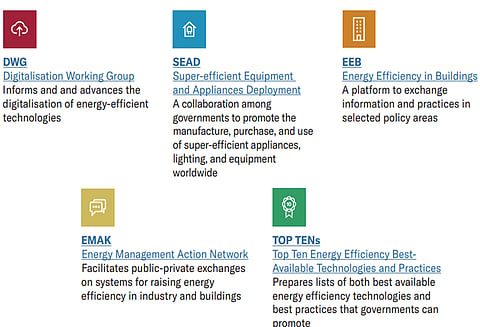The Union Cabinet has given the go-ahead for India to join the International Energy Efficiency Hub. The decision will allow India to be part of a collaboration of countries working to improve the deployment of energy efficiency technologies and processes under the guidance of the International Energy Agency (IEA).
India’s Entry into Energy Efficiency Hub Could Accelerate Solar Power Export Dream
Apart from collaborating with member countries to develop and implement energy efficiency policies, the hub offers India an international platform to borrow and trade clean energy technologies
In a global landscape grappling with climate change and energy security, the International Energy Efficiency Hub signifies a shift towards fulfilling sustainable energy aspirations.
Launched on December 1, 2021, by the IEA in Paris, the Hub has set a target for its members to reach net zero emissions by 2050. As of July 2024, sixteen countries and unions, including Argentina, Australia, Brazil, Canada, China, Denmark, the European Commission, France, Germany, Japan, Korea, Luxembourg, Russia, Saudi Arabia, the United Kingdom and the United States were part of the Hub.
The Hub is designed to encourage cooperation among nations, organisations and other stakeholders in advancing energy efficiency and decreasing carbon emissions worldwide. Energy efficiency entails utilising less energy to deliver the same service, leading to reductions in energy consumption and its environmental effects.
Outlook Business decodes the strategic significance of India joining the Hub.
What is an Energy Hub?
An energy hub is a collaborative energy system where multiple parties, including energy producers, consumers and storages can coordinate, exchange and optimise production and consumption of energy.
The concept of energy hubs was introduced nearly two decades ago in a paper “The energy hub: A powerful concept for future energy systems”. Though the idea is not recent, it continues to be relevant in a world characterised by rising demand for energy, while seeking to reduce dependence on limited reserves of fossil fuels.
Energy hubs help reduce reliance on one source of energy. They address demand-supply imbalances with storage solutions and power trading within the hub. Those participating in the hub can also seek economic benefits through collective investments in flexible assets and through market participation as a group.
What is in it for Businesses?
Businesses stand to gain by getting access to extra capacity that they need through collaboration with other businesses.
These hubs facilitate integration of diverse renewable energy sources. They could play an important role in industrial transition, increasing flexibility and resilience of the energy system. This is valuable in meeting decarbonisation and sustainability targets.
Why do Countries Want to be a Part of the Hub?
The Energy Efficiency Hub is a global platform for collaboration aimed at delivering social, economic and environmental benefits that come from more efficient use of energy. It facilitates government-to-government exchanges on efficiency policy, regulation and implementation and topics relevant to real-world challenges faced by its members. Digitalisation, efficient equipment and appliance deployment, best energy efficiency technologies and energy management, and sharing of best practices are some of the areas of collaboration under the Hub, states its Annual Report-2023.
Members collaborate through thematic task groups. Five task groups are in operation.

Policy analysts and technical specialists have greatly gained from their participation in discussions and forums facilitated by the Hub, focusing on topics such as industrial heat pumps, digitalisation, building efficiency and industrial energy efficiency.
Experts point out that the Hub also serves as a platform for countries that lack avenues for “institutional dialogue”. It also allows for examination of the strengths and weaknesses of energy efficiency policies while offering international insights. This process enables member nations to develop and implement effective national energy efficiency policies.
How can India Make the Most of its Participation in the Hub?
India benefits from collaboration opportunities with other member states. The country is well placed to share its expertise and learn from best practices of other member nations. The Bureau of Energy Efficiency (BEE) has been designated as the statutory agency for implementing the Hub on behalf of India.
In 2022 India submitted its updated nationally determined contribution (NDC) to the United Nations Framework Convention on Climate Change (UNFCCC) at COP27. India pledged to reduce emissions intensity of its gross domestic product (GDP) by 45% by 2030 from 2005 levels and achieve 50% of cumulative electric power installed capacity from non-fossil fuel-based energy resources by 2030. India is among the few countries to showcase its net zero emission goals by 2070. The path to that destination is being planned in line with the country’s development goals.
Going ahead, membership of the Hub also provides India an international opportunity to showcase, borrow and trade clean energy technologies. India ranks fourth globally in renewable energy installed capacity, as per policy network REN21’s Renewables 2024 Global Status Report. The country has plans to eventually become a net exporter of solar power. India’s solar industry has the capability to produce 100 gigawatts of solar modules annually by 2026. As part of the Hub, India can cater to both its domestic market and the world. In October 2023, India and Saudi Arabia signed a memorandum of understanding (MoU) to promote investments in renewable energy in each other’s country. These collaborations will go a long way.